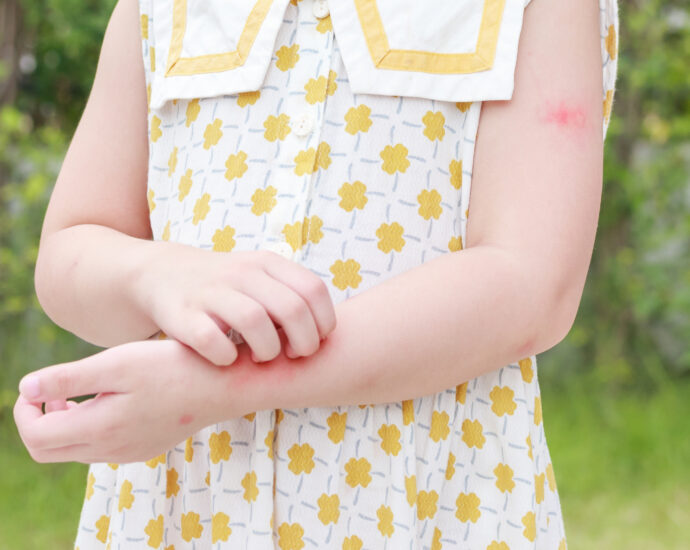Eczema, also known as atopic dermatitis, is a common skin condition that affects millions of children worldwide. It is characterized by dry, itchy, inflamed skin and can cause significant discomfort. While eczema is not contagious, it can be chronic, requiring ongoing management to keep symptoms under control. This article will help parents understand the causes, treatments, and solutions for managing eczema in children.
Page Contents
What Causes Eczema in Kids?
Eczema is caused by a combination of genetic and environmental factors. While researchers do not fully understand why some children develop eczema and others do not, the following factors contribute to its onset:
- Genetics and Family History
Children with eczema often have a family history of allergies, asthma, or hay fever (known as the atopic triad). If one or both parents have eczema, there is a higher likelihood that their child will develop it as well.
- Weakened Skin Barrier
Healthy skin acts as a protective barrier to keep moisture in and irritants out. Kids with eczema have a weakened skin barrier, which means their skin loses moisture quickly, becoming dry, cracked, and vulnerable to irritants and allergens.
- Immune System Overreaction
Children with eczema often have an overactive immune system that reacts strongly to triggers, such as allergens or irritants. This leads to inflammation, redness, and itching.
- Environmental Triggers
Certain external factors can trigger or worsen eczema flare-ups, including:
- Weather changes (cold, dry air or hot, humid conditions)
- Allergens (dust mites, pet dander, pollen)
- Irritants (soaps, detergents, fragrances, and certain fabrics like wool)
- Food allergies (dairy, eggs, nuts, soy, and wheat)
- Stress (emotional stress can cause flare-ups)
- Sweat and overheating (can make itching worse)
Symptoms of Eczema in Children
Eczema symptoms vary by age and severity. However, common signs include:
- Dry, itchy skin (the most common symptom)
- Red, inflamed patches (often on cheeks, arms, and legs)
- Cracked or scaly skin
- Oozing or crusting (from scratching or infection)
- Thickened or leathery skin (from chronic scratching)
Treatment Options for Kids’ Eczema
There is no cure for eczema, but it can be managed with proper treatment and skincare. The main goal is to reduce itching, prevent flare-ups, and repair the skin barrier.
- Daily Moisturizing
Keeping the skin hydrated is the most important step in managing eczema.
- Use a thick, fragrance-free moisturizer or ointment (like petroleum jelly or ceramide-based creams) twice a day.
- Apply moisturizer immediately after bathing to lock in moisture.
- Look for products labeled hypoallergenic and dermatologist-tested.
- Bathing Tips
- Give short, lukewarm baths (10-15 minutes max).
- Use gentle, fragrance-free cleansers (avoid harsh soaps).
- Pat (don’t rub) the skin dry and apply moisturizer immediately.
- Anti-Itch Medications
- Topical Steroids: Low-strength hydrocortisone creams (1%) can help reduce inflammation and itching. For severe cases, a doctor may prescribe stronger steroids.
- Antihistamines: If itching interferes with sleep, pediatricians may recommend antihistamines like Benadryl or Zyrtec to reduce nighttime scratching.
- Avoiding Triggers
Identifying and avoiding triggers can help prevent flare-ups:
- Choose cotton clothing over wool or synthetic fabrics.
- Use hypoallergenic detergents and avoid fabric softeners.
- Keep indoor humidity levels between 40-50% with a humidifier.
- Trim nails short to prevent scratching and infection.
- Prescription Treatments for Severe Eczema
If over-the-counter treatments don’t work, a pediatrician or dermatologist may recommend:
- Prescription steroids or calcineurin inhibitors (like Elidel or Protopic) to reduce inflammation.
- Biologic drugs (such as Dupixent) for severe, treatment-resistant eczema.
- Antibiotics if eczema becomes infected.
Lifestyle Solutions for Managing Eczema
- Diet and Nutrition
While diet is not a direct cause of eczema, certain food allergies can trigger flare-ups. Common culprits include:
- Dairy
- Eggs
- Nuts
- Soy
- Wheat
If you suspect a food allergy, consult a pediatrician or allergist for testing.
- Managing Stress
Emotional stress can worsen eczema. Help children manage stress through:
- Relaxation techniques (deep breathing, mindfulness)
- Engaging in play and physical activity
- Maintaining a consistent sleep schedule
- Using Protective Clothing
- Dress children in soft, breathable fabrics like cotton.
- Use gloves or mittens at night to prevent scratching.
- Layer appropriately in cold weather to prevent dryness.
When to See a Doctor
You should consult a doctor if:
- Your child’s eczema does not improve with home treatments.
- The skin becomes infected (red, swollen, pus-filled, or warm to the touch).
- Your child’s sleep or daily activities are disrupted due to itching.
- Over-the-counter treatments aren’t enough and stronger medications may be needed.
A dermatologist or allergist can provide more advanced treatments, including allergy testing and prescription therapies.
Final Thoughts
Eczema is a manageable but often lifelong condition. With proper skincare, avoidance of triggers, and medical treatments when necessary, children with eczema can live happy, comfortable lives.
As a parent, your role is to keep their skin moisturized, identify and avoid triggers, and seek medical help if needed. By taking a consistent approach, you can help reduce flare-ups and make eczema easier to manage.
If you suspect your child has eczema or their symptoms are worsening, consult a pediatrician or dermatologist for guidance.
READ MORE: Common Skin Conditions by Age Range: A Comprehensive Overview
Sources:
https://kidshealth.org/en/parents/eczema-atopic-dermatitis.html
https://www.childrenshospital.org/conditions/eczema
https://www.healthychildren.org/English/health-issues/conditions/skin/Pages/How-to-Treat-and-Control-Eczema-Rashes-in-Children.aspx
